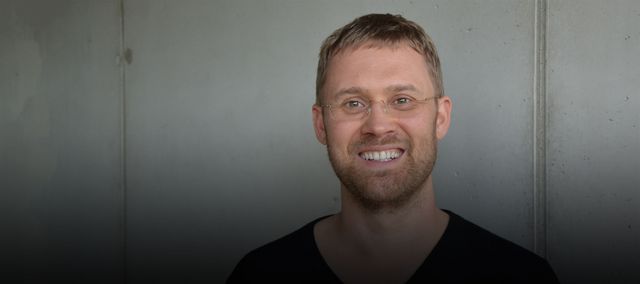02 May 2019
Anyone going to school today is growing up with the Internet. But how to protect their data or use social networks safely is something many digital natives know nothing about. And parents and teachers often don't know their way around the digital world well enough to accompany young people as they navigate this new terrain. Which is why Steffen Haschler and his fellow hackers from the Chaos Computer Club are going to schools as part of the “Chaos macht Schule” (“Learning through Chaos”) project to improve the understanding of technology and the media literacy of young people, parents and teachers alike.
Name:
Steffen Haschler
Age:
39
Occupation:
Teacher
Website:
https://www.steffen-haschler.de
What is “Chaos macht Schule”?
Many parents and teachers lack the technical knowledge to answer the questions young people have about the appropriate use of new technology. But there’s a lot to be aware of in the digital world, and if young people are going to reach maturity digitally as well as in the analogue world, then they need competent support. This is the knowledge gap the Chaos Computer Club wants to plug with its nationwide project in Germany, “Chaos macht Schule” (CMS). CMS has been around for over ten years. It’s implemented locally on a voluntary basis, which is why the availability of workshops can vary from region to region.
How does this kind of workshop work, and what do you teach the students?
We mostly offer workshops for individual classes, but also for teachers and parents. When we visit a class, we pick up on the real lives of young people and take a look with them behind the scenes of the digital world. Why are services like Google and WhatsApp free of charge? Can I believe everything that's on the internet? What are rights to a private life, and why should I respect them, especially in the digital environment? How can I safely use social networks? What are hackers? How can I protect my data from unauthorised access? What is open-source software, and why should I use it? These are probably the most common questions we get asked in our workshops. Although we’re flexible when it comes to answering them and talk about them in advance.
"When we visit a class, we pick up on the real lives of young people and take a look with them behind the scenes of the digital world."
Which issues do young people find particularly fascinating? At the same time, where’s the greatest need for catching up?
As we’re a hackers’ club, it goes without saying that they want to find out about hackers. Maybe also about the dark web. We usually also run a few demos to show them how easy it can be to fool IT systems or get around notionally secure barriers. Since there’s no computer science teaching in many schools, the ideas people have about technology are usually wide of the mark. In other words, we often have to explain how data actually make their way through the Internet and where this can be problematic. or what metadata are.
You also host lectures and workshops for parents and teachers. What are the most important topics and the most pressing issues for them?
Parents are mostly keen to understand what youngsters are doing online. And they’re also exercised by data protection or IT security issues. With teachers, the issues are actually for the most part the same. At the end of the day, there’ve been a lot of developments in recent years that many of them haven’t fully grasped, which I suspect is why they feel insecure.
The Digital Pact will soon provide the German states with more funding to expand digital infrastructure in schools. So are we nearly home and dry?
In this respect, the path is the goal. Digitalisation is not a process which is heading to a final conclusion. Things are only going to develop faster and faster. We welcome the fact that the Digital Pact is finally up and running. We were counting on the billions promised by German research minister Johanna Wanka back in 2016 and were calling on politicians at the time to make more meaningful use of taxpayers’ money. These demands haven’t changed to date. Good infrastructure is a prerequisite for a modern education. But it comes at a price. First of all, when it comes to initial procurement – which is something the Pact is now taking care of – but above all in terms of maintenance and educational concepts. A huge training initiative is needed here. The fact that so little knowledge about our digital issues is currently being communicated in the teacher training is a travesty as well as being dangerously reckless when it comes to safeguarding the state of knowledge in Germany. In this respect, if we’re anywhere at all, it’s only at the very start of the path.
More and more schools are integrating media science into their timetables. From your point of view, is this the right way to go?
If media literacy is being communicated across all the disciplines, that's good. The last thing we need is yet another closed-off field of learning in our schools. Digitalisation is part of every area of our lives, so there are reasons to engage with it in every subject across the board.
From your point of view, what constitutes “digital education”, and what are the prerequisites for it to succeed?
If you ask young people, they won’t make a distinction between digital and non-digital education. They’re just concerned with their education full stop. With what we can give them to help them meet the challenges that come their way. And when you think about how much strain we’re putting the planet and our economic and social systems under, both locally and globally, there’s no shortage of those. A prerequisite for successful education is going to be to ramp up the budget allocated to it. I’m thinking in orders of magnitude and not in terms of one-off payments through a digital pact. And that we shouldn’t have to accept that there are wealthy patrons of schools which can equip them with state-of-the-art kit alongside other education authorities which can’t afford to do so. We have to give teachers what they need. In training, in further education. As a general principle, no-one should ever think that our level of education is as good as it gets. Further education needs to become an integral part of day-to-day work. If this is going to happen, the employers need to offer some slack. We need to have the courage to make major changes to today's school system and also to make mistakes in the process. The important thing is that we quickly learn from them and correct our course accordingly. Nothing should be off-limits to our imagination. Perhaps a constitutional right to lifelong education is better than compulsory schooling? I’m deliberately being provocative here.
Which digital product has yet to be invented?
Gosh! I’m thinking about schools right now. What I’d really love to see would be data goggles. Today’s technology would also allow us to use them without breaching privacy laws. Augmented reality would revolutionise teaching, and we’d no longer need screens; instead we’d be able to furnish surfaces and objects with completely different layers. The sky’s pretty much the limit here. Incidentally, we’d no longer even need “the Internet” but would be able to work with local data centres. This would smash the monopolies of the big American platforms ... which is also an exciting thought.
And which products can you do without?
The whiteboard. For me, this is the epitome of symbolic and pseudo-digitalisation. It’s not that whiteboards didn’t have their uses, but they were generally hung on the wall and then used as screens or like chalk boards. That can’t be the way. As they’re maintenance-intensive, it quickly becomes apparent to look at them that they need professional maintenance ...
Would you like a household robot?
It would depend for which tasks and how it would be integrated into my home network. I wouldn’t want it to use my electricity to go digging for cryptocurrencies for other people or to neutralise my online security ... I’d quite like a robotic vacuum cleaner, although it wouldn’t be able to get over the door thresholds in our house.
Which technical application will always remain a mystery for you?
I find that some things don’t add any value to life or make any sense. But as I’m a curious type, I’d take a closer look at them if I had to. I want to understand technology, at least in principle.
When were you last offline for 24 hours?
Probably on my last flight to Australia. I don’t manage it at other times, sadly. But don't tell my students that; after all, I tell them how important it is to have down time ...
A holiday without Wi-Fi - is that a dream or a nightmare?
If I happened to need a satnav, it would be a nightmare. If I was off hiking in Norway, it would be great! Although, funnily enough, the mobile network in even the remotest national park was better than it is at home. But that's another story. :-)
In the #explore format we’re giving a regular voice to exciting and inspiring people from the digital scene - to researchers, bloggers, start-up founders, entrepreneurs, hackers, and visionaries.


